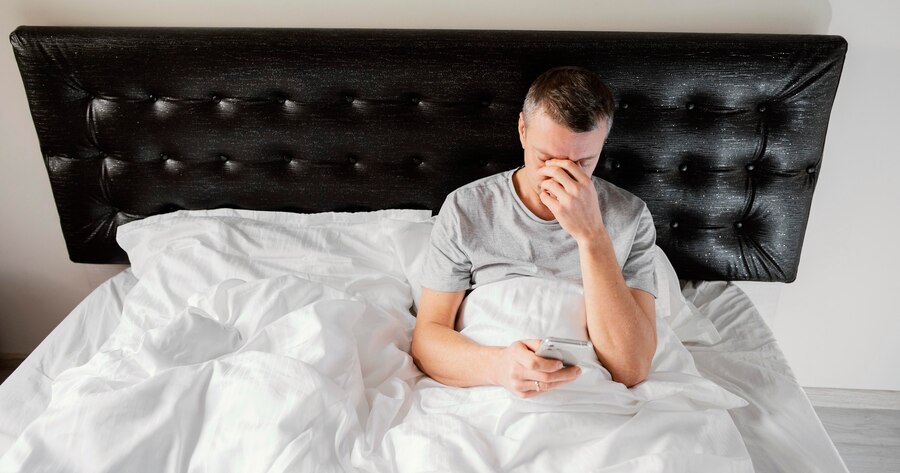
April 18, 2024, By Virginia TMJ Facial Pain and Sleep Center
Do you ever feel like you can never quite get enough sleep, no matter how many hours you spend in bed? You might be surprised to learn that chronic fatigue can be linked to a sleep disorder called sleep apnea. Here we’ll explore the connection between these two conditions and how to improve your sleep quality and energy levels.
Understanding Sleep Apnea
IIt is a serious sleep disorder characterized by repeated pauses in breathing during sleep. These pauses can happen dozens or even hundreds of times a night, disrupting your sleep cycle and preventing you from getting the deep, restorative sleep your body needs. There are two main types discussed:
- Obstructive sleep apnea (OSA): The most common type, OSA occurs when the airway becomes blocked or narrowed during sleep. This can be caused by enlarged tonsils, a large tongue, or excess weight around the neck.
- Central sleep apnea (CSA): This type is less common and occurs when the brain fails to send signals to the muscles that control breathing.
Sleep Apnea Symptoms
Here are some common symptoms :
- Loud snoring
- Gasping or choking during sleep
- Excessive daytime sleepiness and fatigue
- Difficulty concentrating
- Morning headaches
- Dry mouth or sore throat
- Restless sleep or frequent awakenings
If you experience any of these symptoms, it’s important to see a doctor to get tested . Early diagnosis and treatment can significantly improve your sleep quality and overall health.
Chronic Fatigue and How It Impacts You
Chronic fatigue syndrome (CFS) is a debilitating condition characterized by extreme fatigue that lasts for at least six months and isn’t improved by rest. People with CFS often experience other symptoms such as:
- Muscle pain
- Memory problems
- Difficulty sleeping (even though they feel tired)
The Link Between Sleep Apnea and Chronic Fatigue
Sleep apnea and chronic fatigue can be like a vicious cycle. It disrupts sleep, leading to fatigue. This fatigue can make it harder to fall asleep and stay asleep at night, worsening its symptoms. Additionally, both conditions share some common underlying factors, such as inflammation, which may contribute to their connection.
Getting Help for Sleep Apnea and Chronic Fatigue
If you suspect you might have sleep disorders or chronic fatigue, it’s important to see a doctor or sleep specialist. They can conduct a sleep study to diagnose sleep apnea and develop a treatment plan. Treatment often includes:
- Continuous positive airway pressure (CPAP) therapy: A machine that uses a mask to deliver a gentle stream of air to keep your airway open during sleep.
- Lifestyle modifications: Losing weight, avoiding alcohol before bed, and quitting smoking can all help improve its symptoms.
- Oral appliances: In some cases, a specially designed mouthpiece can help keep your airway open.
There is no cure for chronic fatigue, but treatment can help manage symptoms and improve quality of life. Treatment for chronic fatigue may include:
- Lifestyle changes: Eating a healthy diet, exercising regularly, and getting enough sleep are all important for managing chronic fatigue.
- Medications: Certain medications can help manage pain and sleep problems associated with CFS.
- Cognitive-behavioral therapy (CBT): This type of therapy can help you learn to manage stress and improve sleep habits.
Simple Sleep and Lifestyle Tips
In addition to seeking professional help, there are some things you can do at home to improve your sleep quality and manage chronic fatigue:
- Establish a regular sleep schedule: Go to bed and wake up at the same time each day, even on weekends.
- Create a relaxing bedtime routine: Wind down before bed with calming activities like reading or taking a warm bath.
- Make your bedroom sleep-friendly: Keep it dark, quiet, and cool.
- Eat a healthy diet and stay hydrated: What you eat and drink can affect your sleep quality and energy levels.
- Exercise regularly: Physical activity can boost your energy levels and improve sleep.
- Manage stress: Chronic stress can worsen both sleep apnea and chronic fatigue. Practice relaxation techniques like yoga or meditation.
The Path to Better Sleep and More Energy
If you’re struggling with sleep apnea or chronic fatigue, you don’t have to go it alone. Virginia TMJ Facial Pain and Sleep Center offers comprehensive sleep studies, diagnosis, and treatment for sleep disorders. They can also help you develop a plan to manage chronic fatigue and improve your overall sleep quality and energy levels.
Taking Charge of Your Health
By understanding the connection between sleep apnea and chronic fatigue, and by seeking professional help, you can take control of your health and experience a more energetic and fulfilling life. Remember, a good night’s sleep is essential for overall health and well-being.
